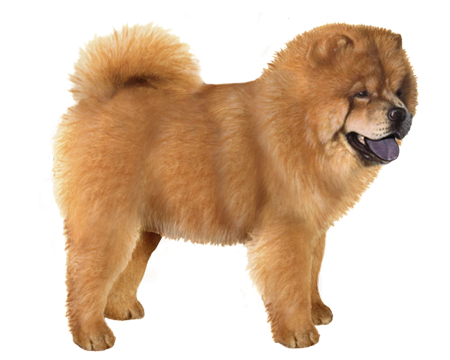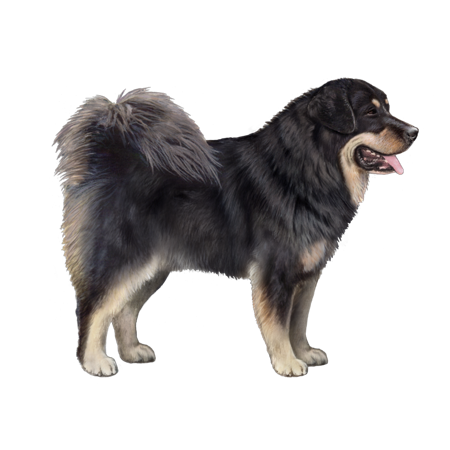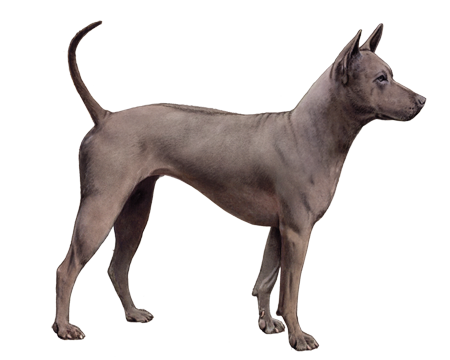
Tibetan Mastiff (Zang Ao, Nyingchi Type)
The Tibetan Mastiff (Zang Ao, Nyingchi Type)—also called the Nyingchi Tibetan Mastiff—is a massive guard dog breed from Tibet, China. Despite the imposing size and protective nature of these mellow pups, they make gentle family pets.
Interested in discovering if your dog is a Tibetan Mastiff (Zang Ao, Nyingchi Type)?
Check out Wisdom Panel's DNA tests.
Tibetan Mastiff (Zang Ao, Nyingchi Type) Traits
General Appearance
The Nyingchi Tibetan Mastiff is an enormous dog with a large head, rectangular body, and long limbs.
Coat and Coloring
Nyingchi Tibetan Mastiffs have thick, short, smooth hair and (unlike the Tibetan Mastiff) no mane. Their coats are typically all black or tan-pointed, with some having white markings.
Distinctive Physical Traits
These dogs have broad heads with substantial back skulls, deep-set, almond-shaped eyes, and full, square muzzles. They carry their feathered tails curled over their backs.
Tibetan Mastiff (Zang Ao, Nyingchi Type) Temperament
Nyingchi Tibetan Mastiffs are often reserved, protective of family (but not overly affectionate), and aloof with strangers. And because they're inclined to bark, rural life suits them better than close-in city living.
Keep in mind that these pups can also be independent, strong-willed, territorial, and possessive of food or toys. With such tendencies, early socialization is crucial to help your dog learn how to properly interact with other animals, children, unfamiliar guests.
Tibetan Mastiff (Zang Ao, Nyingchi Type) History
Experts believe the Nyingchi Tibetan Mastiff is a subtype of the Tibetan Mastiff—an ancient breed dating back to 1100 B.C. Unlike other mastiff breeds that traveled alongside the Persians, Greeks, and Romans, Tibetan Mastiffs remained isolated in the Himalayan Mountains and evolved naturally in their environment.
Evidence suggests Nyingchi Tibetan Mastiffs developed in the town of Nyingchi (also known as Linzhi and Nyingtri) in southeastern Tibet, China. These massive dogs guarded property and used their strong, deep barks to alert their owners to uninvited visitors.
Because of their centuries-long isolation, the Nyingchi Tibetan Mastiff and Tibetan Mastiff are rare breeds today.
Tibetan Mastiff (Zang Ao, Nyingchi Type) Care
Nutrition
Despite their massive size, Nyingchi Tibetan Mastiffs don't have big appetites. In fact, they sometimes skip meals altogether.
To help your pup thrive, seek out a high-quality dog food that’s appropriate for their life stage (e.g., puppy, adult, senior). Also, consider opting for a diet specially formulated for large-breed dogs.
Grooming
The Nyingchi Tibetan Mastiff’s thick coat requires weekly brushing to remove loose fur and dirt. During seasonal shedding periods when these dogs blow their coats, daily grooming with a de-shedding tool will help remove the undercoat.
To reduce your pup's chance of ear infections, check their ears regularly and clean them as needed to remove wax build-up and debris. Nail trims should also be part of every dog's grooming routine.
Lastly, good dental hygiene will support your dog's overall health. In addition to professional cleanings, establish an at-home dental care program that includes regular teeth brushing and veterinarian-recommended dental chews.
Exercise
Nyingchi Tibetan Mastiffs require moderate exercise. But they don't typically enjoy chasing a ball. So, keep your pup active with long, leisurely strolls through the neighborhood. Or better yet, let them roam at their own pace in a large, enclosed area.
Training
As smart dogs, Nyingchi Tibetan Mastiffs get bored fast. They also aren't overly motivated by treats or praise—which can make training a challenge. Try to keep training sessions short and engaging so your dog doesn't lose interest and decide they have better things to do with their time.
Even a well-trained Nyingchi Tibetan Mastiff may not always come when called. So, it's best to keep this breed on a leash in unsecured areas.
Breed Group
Asian and Oceanian
The Asian and Oceanian group is comprised of breeds whose origins lie in Asia, which have spread as far as Australia, the islands of the Pacific, and the Arctic. This group is possibly the most ancient of all breed groups and were bred for a variety of purposes, including guarding, hunting, and as draft dogs.












































